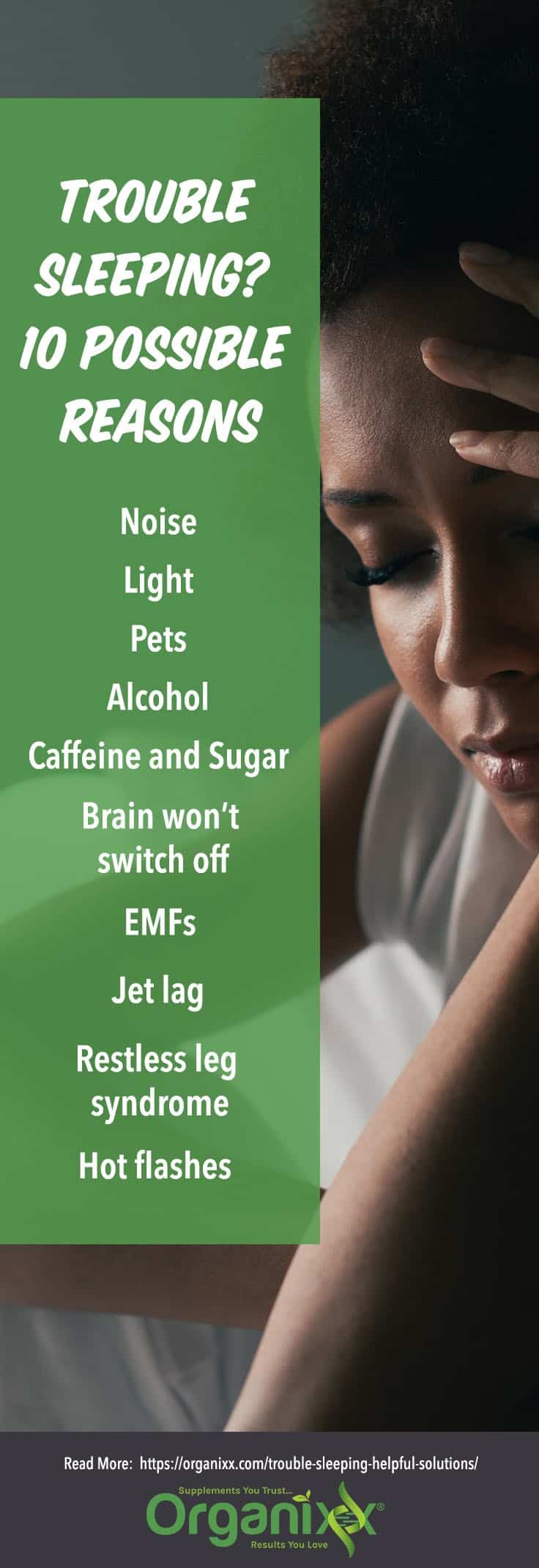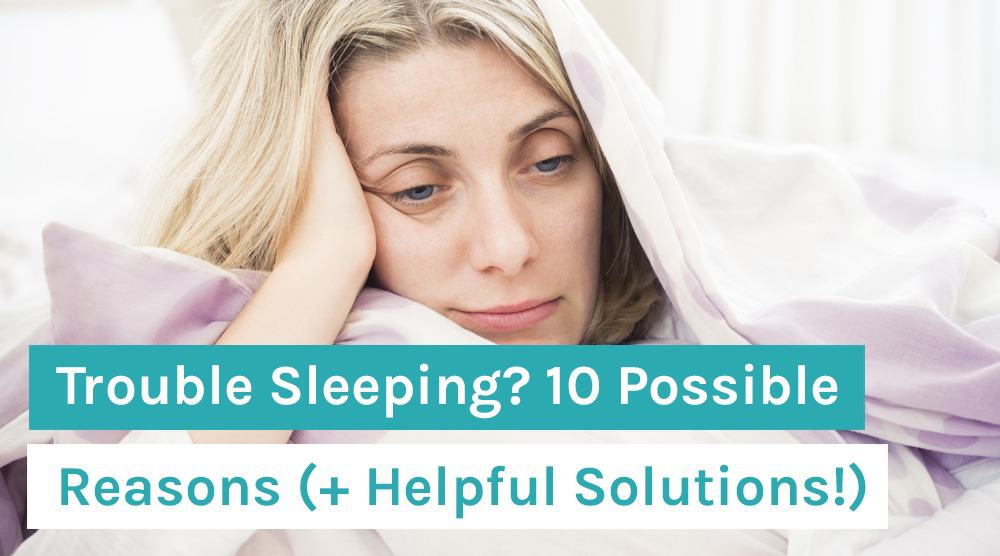Trouble Sleeping? 10 Possible Reasons (+ Helpful Solutions!)
In a hurry? Click here to read the Article Summary...
Do you have trouble getting (and staying asleep) at night? Outside of more complex sleeping disorders, there are 10 major reasons why most people have trouble sleeping. Do any of these apply to you?
10 Reasons You Might Have Trouble Sleeping
Here are some of the major sleep robbers, along with come helpful solutions to solve these particular issues.
#1: Noise
Whether it’s coming from the neighborhood, a snoring partner, crying children, barking dogs, or screaming ambulances, noise can be a big impediment to sleep.
Solution: Noise Reduction.
Depending on the situation, try these things:
- Earplugs
- Turning on a fan in the room or other “white noise” generator (but not too close to the bed, due to the EMF factor – more on that below)
- If a snoring partner is the problem, one of you should move to another room to sleep if possible. (While this is not the best solution for romance, sleep is too important to your health to ignore.)
#2: Light
Too much light entering the bedroom causes a problem because it interferes with the body’s production of melatonin (the hormone that regulates circadian sleep cycles). A 2015 study found that light pollution was associated with a higher rate of breast cancer [1].
Solution: Light Reduction.
Make your bedroom as dark as possible. This is truly important because if your bedroom contains too much light – including that little light from an LED alarm clock or cell phone charger – it directly inhibits the production of melatonin.
Use room-darkening shades (if possible) and rid your bedroom of as many appliances as you can that create little lights at night, no matter how small. Alternatively, you can wear a comfortable eye mask.
 #3: Pets
#3: Pets
Needy pets sleeping on your head do not help you achieve good quality sleep. Pets can disturb sleep by wanting to play at inconvenient hours, or wanting attention.
Solution: Get Pets Out of the Bedroom.
This may be more difficult for some pet owners (and the pets!) than for others. If you are frequently awoken by your playful pet, getting pets out of the bedroom can greatly assist you in getting a restful night’s sleep.
#4: Alcohol
Contrary to popular belief, alcohol does not help one sleep better. One study demonstrated that alcohol decreases the duration of sleep and its efficiency [2].
Solution: Limit Alcohol Intake.
If you’re someone who has trouble sleeping, it’s best to avoid drinking alcohol.
#5: Caffeine and Sugar
Both caffeine and sugar can keep you from resting well. Although how caffeine affects each person varies widely, be aware of how it affects you as an individual. Like sugar, it is a stimulant to the nervous system.
Solution: Limit Caffeine and Sugar.
Try limiting caffeine and sugar after about 3:00pm for a couple of weeks and see if it makes a difference for you.

#6: Brain Won’t Switch Off.
An inability to quiet the mind or stop yourself from worrying or feeling anxious hugely impacts restful sleep. Overthinking and anxiety are in plague proportions, and we are all prone to this at times.
Solutions:
- Avoid Using Some Electronics Prior to Sleep. Try not to work in bed. Use the bed for sleeping. Do not spend long periods of time on your cell phone, laptop, or other electronic devices an hour or two prior to sleeping as they emit blue light and turn off melatonin production.Even some e-readers emit blue light. If using an e-reader, find out whether yours is safe for bedroom use or not.
- Meditation. Try meditation for 20-30 minutes prior to going to bed. Meditation can help you to shut off the overactivity in your brain by slowing your brain waves.For anxiety, positive affirmations can help. If you find your brain is running amok or you are recounting your day and all the things you could have done differently, it can keep you from sleeping.As soon as you catch yourself doing this, stop and ask yourself: “Am I okay right this minute?” If you have a roof over your head, a belly that’s been fed, and you are safe, you are doing better than 50% of the world’s population, so most of the time the answer will be “yes.”Say to yourself, “I am okay right now and right now is all that matters. This is my time for sleeping, not worrying.” This can often help your brain to “shut off.”
- Progressive Relaxation. Practice a relaxation and deep breathing technique which helps to relieve muscle tension and induce a quiet mind. Essentially, take a deep breath and let it go. Tense your feet as much as possible and then let them relax completely. Moving up your body, breathe deeply, then tense and relax various muscle groups until you reach your head.
#7: Electromagnetic Frequencies (EMFs).
Unseen, unheard, but present in most bedrooms, EMFs are caused by computers, WiFi, electric blankets and heating pads, electric appliances, alarm clocks, mobile phones and chargers, etc.
Solution: Remove EMFs from the bedroom:
- Go to an electronics supply store and buy an inexpensive multimeter and use it to test for EMFs in your bedroom. Test everything that is plugged in.
- When using a laptop computer, get a grounding pad and never use the laptop computer on your lap or in the bed.
- Remove all non-essential electric appliances from the bedroom, especially computers with WiFi. If you cannot remove them, unplug them from the wall before you go to bed. Turning them off is not enough as they still emit EMFs.
- Completely remove anything with an LED light or readout. They may be tiny, but they still emit blue light. Exposure to blue light also affects depth and quality of sleep.
- Never charge your cell phone or other electronic devices in the bedroom. Move them to another spot in the house.
#8: Jet Lag
Traveling across time zones creates a temporary problem for your inner clock and disrupts sleep.
 Solutions:
Solutions:
- Light exercise and stretching before, during, and after your flight can be beneficial.
- Hydration helps – avoid drinking alcohol on the flight and drink plenty of filtered water instead.
- Adopt the time zone of your destination. Stay awake during daylight hours no matter how tired you are, then sleep in the evening. This helps your inner clock adjust to the new time zone.
- Three hours before bed, avoid alcohol, caffeine, and heavy meals.
- It may sound odd, but many health experts swear by “grounding” or “earthing” to help alleviate jet lag. This means standing barefoot directly on the earth to help ground yourself to the earth’s energy. You can think of it as getting an “energy infusion” from Mother Nature. Find a patch of grass on the lawn of your hotel, at a nearby park, or some sand at the beach and stand barefoot on the ground for several minutes taking calm, slow breaths.
#9: Restless Leg Syndrome (RLS)
Described as an irresistible urge to move or flex the legs to relieve sensations of itchiness, cramping, restlessness, or other discomforts, this is a problem for many that leads to trouble sleeping.
Solution: Find Out What Triggers Your RLS.
RLS can be caused by many different things, including caffeine and sugar. Try avoiding caffeine and sugar after 3:00 pm, and taking minerals such as potassium and magnesium. Eating some banana or avocado (both high in potassium) prior to bed sometimes relieves RLS. Some people have good results with spraying magnesium oil onto their legs prior to bed. Gentle stretches can also help.
#10: Hot Flashes
Waves of heat that generally start with a feeling of intense anxiety, the urge to throw off all the bed linens, and thirst. Hot flashes generally begin occurring during perimenopause in women (though men can have them as well). Caused by a lack of estrogen and worsened by stress, hot flashes can be enormously disruptive to sleep.
Solutions:
There are many over-the-counter supplements on the market that help reduce the frequency and severity of hot flashes, but if they don’t help, be sure to see a naturopath for help with balancing hormones.
Be sure to check out E-Plexx by Organixx. It delivers targeted ingredients to help support your endocrine system which produces and regulates hormones. It’s a comprehensive, anti-aging formula of 100% organic nutrients, adaptogens, and antioxidants your body needs to support healthy hormone levels.
More Tips to Help With Restful Sleep
- Essential oils. Breathing in high quality essential oils can assist in achieving a deeper, more relaxing sleep. Prior to retiring for the night, besides deep breathing essential oils directly from the bottle or hands, you can also lightly dilute the oils with a carrier oil and massage them into the large arteries on either side of your neck.Effective oils to use include valerian, lavender, ylang ylang, clary sage, and bergamot. (Many of these oils are included in Organixx’s ), which is used commonly used for natural anxiety relief. Hence, better sleep!
- Take a Warm Bath. A comforting warm bath will help to relax your muscles, calm your nervous system, and get you prepared for good quality sleep. Add a cup of Epsom salts to really help your muscles relax.
The powerhouse trio of herbs in Magi-Complexx Essential Oil provides the strongest, most synergistic healing effect, helping sufferers of arthritis pain, constant muscle aches and pains, neuropathy, systemic inflammation, slowed wound healing, circulatory challenges, as well as skin irritations like eczema, psoriasis, and acne.

 Sources:
Sources:
Article Summary
Outside of more complex sleeping disorders, there are 10 major reasons why people don’t sleep well:
- Noise
- Light
- Pets
- Alcohol
- Caffeine and sugar
- Brain won’t switch off
- Electromagnetic frequencies (EMFs)
- Jet Lag
- Restless leg syndrome (RLS)
- Hot flashes
Breathing in high quality essential oils can assist in achieving a deeper, more relaxing sleep.
A warm bath will help to relax your muscles, calm your nervous system, and get you prepared for good quality sleep.


 #3: Pets
#3: Pets
 Solutions:
Solutions:

I have had some problems to sleep.For 17 years a worked I, a clinical laboratory sometimes at night and other in the day.My sleep is very light and I can't sleep more of 6 hours at all.I bless you for your help with these tips.I'll try to practice.My family is in a difficult economical situation and maybe this is cause of a lot of stress for me .Colombia is a very difficult country because there is not work not security and there is not money and very bad health services.Thanks for your help with these teachings for me and my family.blesses